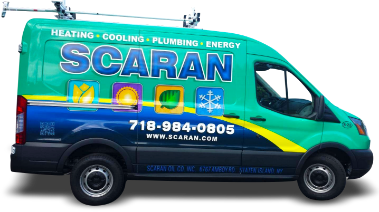Your water heater is built to last, but that doesn’t mean it won’t have problems from time to time. Water quality and how often you use your water heater can affect its performance, efficiency, and lifespan. But how do you know if there’s something wrong with your water heater? Common signs indicating that a water heater needs repair include lack of hot water and strange noises coming from the tank. Understanding the subtle signs that something is wrong can help you address repair needs before they cause big problems for your home.
If you think you need water heater repair in Woodbridge, NJ, our team can help. In the meantime, you can keep reading to learn more about how to know if you need water heater repair. The age of your water heater is also an important factor when deciding whether to repair or replace it. If a water heater is less than ten years old and the problem is minor, repairs are typically effective. Keep in mind that even if you have a tankless water heater, you still may run into problems from time to time, so it’s important to determine the cause of any issues before proceeding with repairs.
Introduction to Water Heaters
Water heaters are a vital part of every household, ensuring you have access to hot water whenever you need it, whether it’s for a relaxing shower, washing dishes, or doing laundry. A reliable water heater not only provides comfort but also supports the smooth running of your daily routines, especially during the colder months in New York. Investing in regular maintenance and timely repair can make your water heater more cost effective, helping you avoid unexpected breakdowns and costly emergencies. Water heaters typically last about 8 to 12 years depending on several factors including type and maintenance. Understanding the basics of how water heaters work and their role in your home is the first step toward ensuring you always have hot water on demand.
Types of Water Heaters
When it comes to choosing a water heater, homeowners have several options, each offering unique benefits. The most common type is the traditional tank water heater, which stores a set amount of hot water in a tank, ready for use at any time. Tankless water heaters, on the other hand, heat water only when you need it, providing endless hot water and significant energy savings since they don’t keep water hot all day. Tankless water heaters typically have a longer lifespan than traditional water heaters, lasting over 20 years compared to 10-15 years for traditional models. Heat pump water heaters use heat from the surrounding air to heat water, making them an eco-friendly and energy-efficient solution. Understanding the differences between these water heaters can help you select the best option for your home, whether you’re installing a new water heater or considering an upgrade for better performance and efficiency.
Signs of Hot Water Loss in Your Home
If you get in the shower or go to wash dishes, only to be met with lukewarm water, something is wrong with your water heater. First, you should check the thermostat settings on your water heater to make sure that the temperature is high enough. Increase the temperature some, but no higher than 120°F, and see if it makes a difference. A damaged dip tube can prevent proper mixing of hot and cold water, leading to lukewarm water.
If you still have lukewarm water, there may be a problem with the gas igniter or a faulty heating element, depending on what type of water heater you have. You could also have an issue with the thermostat. No matter what the problem is, our technicians are equipped to diagnose and fix these issues promptly. Quick repairs by skilled technicians can restore your hot water supply efficiently.
What Strange Noises from Your Water Heater Mean
Aside from hearing water run, you shouldn’t hear any other sounds coming from your water heater. If you hear anything popping or knocking, there may be sediment buildup at the bottom of your tank, which comes from hard water that is high in mineral content. Sediment buildup can negatively affect your unit’s performance and water quality, leading to reduced efficiency and potential damage. Sediment buildup can block heating elements or burners, preventing efficient heating. In some cases, bacteria can also grow in the tank, causing unpleasant odors and requiring disinfection or temperature adjustments. Thankfully, this is an easy fix. You just need a plumber to flush out your system. Regular flushing can save you money by preventing costly repairs and maintaining the quality of your water heater. Ideally, you want to schedule the service annually to prevent the sediment buildup from damaging your gas igniter or electric heating element.
What Discolored Water Says About Your Water Heater
Discolored water is a common sign of water heater problems. If your water is discolored, it may be from the inside of your water heater. Turn the cold water off completely and just run the hot water. Is the water discolored? Then do the opposite. Turn off your hot water and only run your cold water. If the hot water is the only one that is discolored, there’s a good chance that your water heater is to blame. Some repairs for discolored water may be covered under your water heater’s warranty, so be sure to check your policy. When a technician inspects your system, it’s important to present this issue so they can determine the source of the discoloration. If both your hot and cold water are rust-colored, the problem is somewhere else in your plumbing.
Spotting and Addressing Water Heater Leaks
You may think that water leaks are common, since there are pipes connected to your water heater. However, your water heater should be completely airtight and never have leaking issues. If you see water leaking or dripping out from any of your water heater’s connections, it’s important to get the problem addressed right away. Leaking tanks or valves can often be repaired, or you may need to replace the affected component to prevent further water damage. Our technicians carry a wide range of replacement parts to ensure quick repairs and restore your system’s functionality. We will evaluate all available options and help you determine the best course of action for addressing water leaks, taking into account factors like the age and location of your unit, since leaks are more common in an old water heater or in certain locations. If you notice any leaking, request our water heater repair services immediately. Our trained employees are ready to serve local residents and provide reliable services.
Water Heater Maintenance
Regular maintenance is key to maximizing the life expectancy and performance of your water heater. Simple tasks like checking the temperature and pressure relief valve, inspecting the anode rod for corrosion, and flushing the tank to remove sediment buildup can prevent frequent repairs and extend the life of your unit. While some maintenance steps can be handled by homeowners, such as adjusting the temperature or draining a small amount of water to check for sediment, it’s wise to schedule professional service for more thorough inspections and repairs. A well-maintained water heater not only operates more efficiently but also reduces the risk of unexpected breakdowns, saving you money on replacement and repair costs in the long run.
Troubleshooting Water Heater Issues
Even the best water heaters can develop issues over time, from leaks and discolored water to problems with the thermostat or valve. If you notice any unusual signs, such as inconsistent water temperature or water pooling around the unit, start by checking the thermostat settings and ensuring the valve is functioning properly. For more complex problems, like persistent leaks, strange noises, or ongoing discolored water, it’s best to contact a professional technician. They have the expertise to accurately diagnose and repair issues, ensuring your water heater is restored to optimal performance. Prompt troubleshooting and repair can prevent minor issues from turning into major headaches for homeowners.
Water Heater Replacement
No matter how well you maintain your water heater, every unit has a limited life expectancy and will eventually need to be replaced. If your water heater is old, inefficient, or requires frequent repairs, it may be time to consider a new water heater. If your water heater is over 10 years old, a professional might recommend replacing it, especially if the repair cost is more than 50% of a new unit. Today’s options include high-efficiency tankless water heaters and advanced traditional tank models, each offering a range of benefits such as improved performance, lower utility bills, and greater reliability. When replacing your water heater, it’s important to assess factors like the size of your household, energy efficiency, and installation requirements. A professional technician can help you evaluate your needs and recommend the best water heater replacement, ensuring a smooth installation and proper disposal of your old unit. Upgrading to a new water heater can provide lasting comfort, energy savings, and peace of mind for years to come.
Frequently Asked Questions
Question: What are common signs that my water heater needs repair?
Answer: Watch for leaks from any of the connections, discolored or rusty hot water, strange noises like popping or knocking (often due to sediment), and lukewarm output after adjusting the thermostat. These symptoms typically indicate wear, corrosion, or blockages.
Question: Why is my water heater making unusual noises?
Answer: Sounds like popping or knocking usually result from sediment buildup at the tank’s bottom. Flushing the unit, ideally once a year, can resolve this issue and protect sensitive components like the heating element or gas igniter.
Question: What does discolored hot water mean?
Answer: If only the hot water is rust-colored while the cold water remains clear, the problem likely stems from inside the water heater. This is often a warning sign of internal corrosion.
Question: Could thermostat settings be affecting hot water performance?
Answer: Yes. First, ensure the thermostat is set to a safe level (not exceeding 120 °F). If the water remains lukewarm, the heater may have issues with its thermostat, igniter, or heating element that require professional attention.
Contact Scaran today to schedule an appointment with our professionals.













